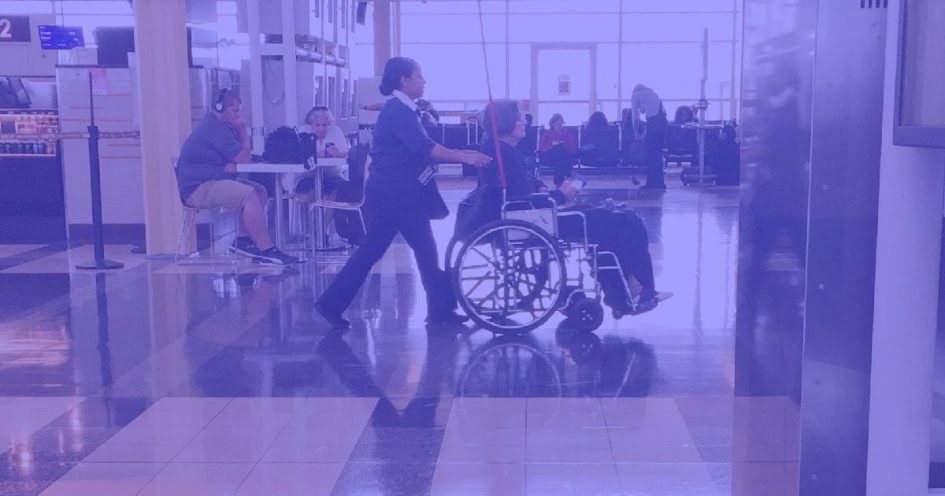Airports should adopt policies to ensure responsible contracting and to improve passenger safety, security and service at our airports. Responsible contractor policies should include provisions to reduce turnover and improve safety by mandating fair wages and protecting workers’ rights to form a union.
In recent decades, major U.S. airlines have set up a system of low-road contracting that drove down wages and working conditions and increased turnover. Today, nearly half of contracted airport workers are immigrants and the majority are people of color. Most are paid less than $12 with few, if any, benefits.
“Let’s be clear, folks who work at the airport, one of the biggest economic engines in the city, should not be struggling to get by.”
-Philadelphia Mayor Jim Kenney
This system of low-road outsourcing hurts working people and their communities and compromises the safety, security and efficiency of our airports.
Between 2002 and 2015, airlines cut direct employment by 20%, even while passenger numbers continued to grow. Some of the most commonly outsourced positions include ground workers, baggage handlers, cabin cleaners, lavatory technicians, and personal service attendants. One study found that, between 2002 and 2012, wages for several key airport and airline job classifications fell by an average of 15%. For baggage handlers, airlines eliminated or outsourced 90% of jobs and cut wages in half—from $25.04 in 2001 to $11.93 in 2015 (in 2015, inflation-adjusted dollars).
Responsible Contractor Policies Are a Proven Way to Reduce Turnover and Improve Security and Service
In response to the rapid shift towards largely unregulated outsourcing by the airline industry, many of the nation’s leading airports have adopted Responsible Contractor Policies. Working in partnership with airports, airlines, and contractors, SEIU has helped develop policies that raise wages, provide emergency response training, and keep experienced personnel on the job.
In Los Angeles, San Francisco and Chicago, airport authorities created policies which require airline contractors to meet high standards around:
- Employee Training
- Wages & Benefits
- Labor Peace
- Equipment Safety
- Worker Retention
- Whistleblower Protection
Los Angeles
 Los Angeles’s Certified Service Provider Program requires contractors to apply for a license prior to operating at the airport.
Los Angeles’s Certified Service Provider Program requires contractors to apply for a license prior to operating at the airport.
Licensure requires:
- Prospective contractors to complete a questionnaire, which allows the City to verify that the companies “have the necessary quality, fitness and capacity to perform the work set forth in the contract.”
- Employees, at minimum, to be paid Los Angeles’ living wage (currently $17.26) and given twelve days total paid leave for sickness, vacation or personal necessity
- Certain workers be retained for at least 90 days from one employer to another when contractors change
- Contractors to meet additional standards such as complying with labor laws which allow workers to choose to organize a union, employee training, labor harmony to protect the airport’s interests, and whistle blower protection.
San Francisco
 San Francisco’s Quality Standards Program (QSP) establishes labor peace, training, equipment, and compensation and benefits standards for airlines and service providers whose employees perform services impacting safety and security at SFO. In 1999, the FAA reported that turnover among screeners was 110%. By 2014, following the implementation of the Quality Standards Program, turnover among full-time screeners was, by one estimate, less than 3%. Despite ongoing pressure from some airlines and contractors to reduce standards for workers, SFO’s pro-active approach to improving standards for workers has made a meaningful difference.
San Francisco’s Quality Standards Program (QSP) establishes labor peace, training, equipment, and compensation and benefits standards for airlines and service providers whose employees perform services impacting safety and security at SFO. In 1999, the FAA reported that turnover among screeners was 110%. By 2014, following the implementation of the Quality Standards Program, turnover among full-time screeners was, by one estimate, less than 3%. Despite ongoing pressure from some airlines and contractors to reduce standards for workers, SFO’s pro-active approach to improving standards for workers has made a meaningful difference.
Chicago
 The Chicago City Council, unanimously approved an ordinance that gives nearly 8,000 O’Hare and Midway airport workers a raise to $13.45, the right to join a union, and the training they need to keep the public safe. Since 2009, contractors at O’Hare have paid over $1.3 Million to settle wage and hour claims in court.
The Chicago City Council, unanimously approved an ordinance that gives nearly 8,000 O’Hare and Midway airport workers a raise to $13.45, the right to join a union, and the training they need to keep the public safe. Since 2009, contractors at O’Hare have paid over $1.3 Million to settle wage and hour claims in court.
In addition to labor peace, higher wages, and a training program, the ordinance includes a permitting plan and requires improved vehicle and equipment safety. The raise is indexed to inflation annually and workers who raise safety or security concerns will be protected from employer retaliation.
Like its predecessors at LAX and SFO, Chicago’s license program institutionalizes high standards by holding airlines and their contractors accountable to explicit performance requirements. If Chicago’s airport management finds that a contractor is failing to meet these requirements, they have remedies up to and including terminating the license.
Elected officials are holding airports to higher standards
 “Every worker should have the freedom to unionize and the opportunity to earn a living wage. That‘s why I’m joining together with mayors across the country to push for good paying jobs and the right to form unions at our nation’s airports.”
“Every worker should have the freedom to unionize and the opportunity to earn a living wage. That‘s why I’m joining together with mayors across the country to push for good paying jobs and the right to form unions at our nation’s airports.”
-New York City Mayor Bill de Blasio
At the U.S. Conference of Mayors’ annual meeting in the summer of 2017, mayors passed a resolution that:
- “urges all airlines to hire responsible union contractors and ensure that contracted airport workers are paid a living wage with benefits and the freedom to form a union;”
- “urges Cities to advocate for airports to be engines of prosperity that provide family-sustaining jobs and boost the economy in our communities;” and
- “urges local, state, and federal elected officials to ensure that corporations that benefit from taxpayer dollars create good, family-sustaining jobs.
